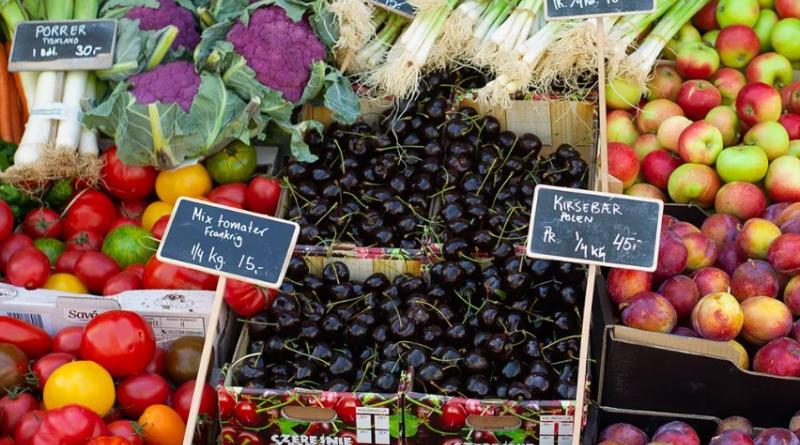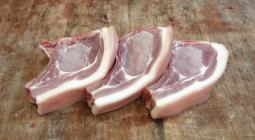Denmark: The major pork producer trying to wean itself off eating meat

T
Trine Krebs adores vegetables. "When I get a plant in my hands that I can feel is healthy, I can smell it, feel it, almost taste it in my mouth," the 47-year-old, cardigan-clad farmer enthuses over Zoom.
Described affectionately by some as "Miss Dry-Legume of Denmark", Krebs has won awards for her advocacy of plant-rich – or "plant-rig" in Danish – diets. To this end she has run food festivals, trained cooks and invented songs. She even appeared on a Danish dating show, Farmer Looking for Love, and taught her prospective romantic interests to cook legumes: the first refused, the second was luke-warm, but the third was totally won over. "He thought it tasted amazing and wanted me to teach all his friends."
Yet not all in Denmark share Krebs' passion for pulses. The majority of Danes – 57% – say they have no interest in reducing the amount of meat they consume, making it the European nation least interested in cutting back. This reluctance stands in tension with science showing livestock's impact on the planet: animal-based foods cause twice as many emissions as plant-based ones, and pose major threats to forests and biodiversity. It also runs contrary to Denmark's new dietary guidelines, which recommend just 350g (0.77lb) of meat per week. Most Danes eat three times that amount (for Americans, it's three and a half).
The reasons for this reticence could have deep roots. "In our brains we're still on the savannah trying to survive," Krebs suggests. She points to how Western diets have become high in simple sugars, fat and meat, especially in colder parts of Europe, while noting that more recent cultural history may also play its part. "As in Britain, Denmark once had big, historic households of nobles with beautiful gardens filled with the best fruit and veg. Then that disappeared," she says. Now, instead of being seen as "sexy", vegetable dishes are too often considered a dull necessity, added to a meal "for health not pleasure".
The Danish government, however, has a plan for change. In a world first this October, Mette Frederiksen's administration published a national roadmap for plant-based food. The 40-page document lays out the country's commitment to normalising plant-rich diets, as well as to incentivising the production of more vegetables and alternative-proteins. Under its recommendations, which cover the entire food chain, everything from organic root vegetables to processed dairy substitutes and fermented fungi are to be supported. Meat and dairy do not have to be entirely off the menu, but the aim is for them to play a less dominant role.
Walter Willet, a professor of nutrition at Harvard University who led the Eat-Lancet Commission's report into the optimal diet for a healthy planet, is "impressed" by the step and knows of "no other government" that has implemented such a national-level plan. "We should not be surprised that Denmark has taken a lead in this effort; they were a decade ahead of other counties in banning trans fat, and have been a global leader in developing green energy," he notes.
But the elephant – or perhaps the pig – in the room is Denmark's thriving meat industry. "I will be interested to learn how they dealt with this issue," says Willet.
Willet's reservation is well-placed. When other meat-producing European countries have tried to curb or replace animal-products to address climate change, they have met with pushback. Italy this month banned cell-based meat after outcry from farmers. In the Netherlands, a 2019 effort to crackdown on nitrogen emissions by buying out livestock farms sparked vast, tractor-led protests.
As the only European nation with "more pigs than people", Denmark is arguably as beholden to the interests of its livestock industry as any rich, meat-consuming nation. Yet its "plant-rig" policies have so far staved off serious backlash. Even the right-wing Denmark Democrats, who oppose a possible emissions tax on agriculture, gave their political backing to a grant that supports the plan.
Some Danes now hope their example can be a lead for other wealthy nations to follow. Not least since, at this year's COP28 climate summit in Dubai, the UN's Food & Agriculture Organization is set to publish its own food roadmap advising Western countries to reduce their meat consumption. Two-thirds of food served at the summit will also be vegan or vegetarian for the first time.
So what can the world learn from Denmark's plan for a plant-based shift?
From pigs to peas
The most important ingredients for success might just be collaboration between partners who don't always see eye-to-eye; from environmental NGOs, to business leaders and farmers. Or so suggests Rune-Christoffer Dragsdahl, secretary-general of the Vegetarian Society of Denmark, who helped draft the plan. "It's clear there's too much livestock in the world. But if you want change you need a convincing and inspiring alternative, not just criticism."
The seeds of the shift were sown, Dragsdahl explains, in the Greta Thunberg-inspired demonstrations which preceded Denmark's 2019 election. As in the UK, mass protests that year saw climate change become a major political issue and led the country to adopt an ambitious 70% emission reduction target. Meeting this goal, however, would require change for the food and farming sector, among many others. To help bring plant-based diets and food systems into the national conversation, the Vegetarian Society established a new network for plant proteins.
The network's seminars and conferences helped to form unusual new alliances. The first was a vision report, produced by five green NGOs in collaboration with the newly founded Danish Plant-Based Business Association. The second was a plant-based research and development strategy from two green NGOs working together with the Agriculture and Food Council, which represents many Danish livestock farmers.
And the third was a new "knowledge centre" developed by the Vegetarian Society and Organic Denmark, who also advocate for livestock – a pairing that you might imagine have few shared interests. But they sought out their common ground to make the partnership happen. "We concentrated on the need for more plant-based products to be produced without pesticides," Dragsdahl explains.
These collaborations, in turn, helped the politicians see there was space for cross-party support. Ida Auken, a Danish MP and former environment minister, says she would now advise other nations to build similar alliances: "Get the farmers on board, get the unions on board, but also be clear in your vision: say this is where we're going and do it incrementally."
Pointing out the potential for job creation is also key, Auken adds. Denmark is already seeing job losses in the dairy and slaughter sectors, in part due to rising costs of production in the wake of the war in Ukraine. The new plant-based industry can offer hope of change, Auken says. "If we get 2% of that plant-based market, it could mean 20,000 to 40,000 jobs, which is a lot in Denmark."
Carrying the spirit of cooperation into the delivery of the plan is also essential. And helping with this is the additional creation of a Plant-Based Food Grant. This 1.25bn kroner (£155m/$195m) fund will support the growth of plant-based production, with half the amount earmarked for projects related to organic foods.
Dominant among the grant’s first round of funding awards, announced this week, are initiatives directed at retraining Denmark's professional kitchens and food services. Krebs' own proposal, involving a "vegan travel team'' to train chefs around the country, was among those that received funding. A centralised "knowledge bank" for chefs and a new vegetarian degree for Denmark's hospitality school also got support.
Funding has also been ear-marked for projects that increase the volume and quality of supply: from research into new fermentation techniques, to the production of plant-based cheese and yoghurts. Yet support for plant-based products and cooking can only go so far if consumer demand falls short. So the second-largest chunk of funding has gone to projects aimed at encouraging individuals and supporting retailers. This tranche includes a National Vegetable Week, an educative "Foodjam" at Denmark's 2024 Roskilde Festival and a "Make it Easy" project involving supermarket chains.
Outside the country meanwhile, a collaboration between the Danish Agriculture and Food Council, the Danish embassy in London and the UK Soil Association will attempt to build-up the British market for Danish exports.
By placing such a large focus on demand-stimulation, rather than punitive measures, Danish politicians are hoping their agricultural sector will see plant-based food as an opportunity to build new skills and jobs, not a threat to their livelihoods. "It's such an important climate solution. It's as big as wind-turbines," says Auken of the dietary shift. "We need it not to be a huge fight with farmers, like in the Netherlands, or between vegans and carnivores. But about getting a more interesting food culture."
What can other nations learn?
Other nations are already starting to take note. In Portugal, the Vegetarian Association (AVP) is proposing a National Plan for Plant-based Proteins. And although a Denmark-style fund for legume-production was voted down by its parliament earlier this year, it did receive backing from parties on both the left and right, says AVP's Joana Olivereira.
In Germany, the government has allocated €38m (£32m/$41.5m) in the 2024 budget for the promotion of plant-based, precision-fermented and cell-cultivated proteins, alongside the transformation of agriculture. Jens Tuider from ProVeg International, the biggest vegetarian organisation worldwide, described the move as a "paradigm shift", though notes the one-time amount still falls short of Denmark's larger funding promise and more "comprehensive" plan.
"We're expecting the FAO's roadmap to achieving 1.5C to set out recommendations for high-consuming nations to limit their meat intake, and – having already a leading role in the Beyond Oil and Gas Alliance it is perhaps no surprise that Denmark is once again setting the example," says Helen Harwatt, a research fellow at the think tank Chatham House.
The plant-based shift is also being driven by competition in global trade. This December, for example, South Korea will announce its own plan to promote its plant-based food industry and has already described the market as a "new growth engine".
A Danish-style national plan won’t be the right fit for all, however. Ciniro Costa Jr, a scientist from the Alliance of Biodiversity International and CIAT, points out that many low and middle-income countries, such as Brazil, rely on livestock products and cannot quickly make changes. Instead, other emissions-cutting interventions could help here, he suggests, such as improving pastures and introducing rotational grazing.
And there is still much Denmark has to learn from other countries too, especially about different plant-based recipes and cuisine.
"In India, there's already a substantial reliance on plant-based diets, influenced by cultural, religious, and economic factors," says Sanjay Sethi, executive director of the Plant Based Foods Industry Association, though he notes there is also a need to respond to the surge in demand for meat.
For Denmark, a country with such traditionally meat-based fare, changing habits is perhaps one of the greatest challenges ahead. Yet what a plant-based interpretation of such a diet can look like is something the newly trained tranche of chefs will be helping Danes discover.
--





